Dogs of war: The latest recruits to south Wales' K9 academy
- Published
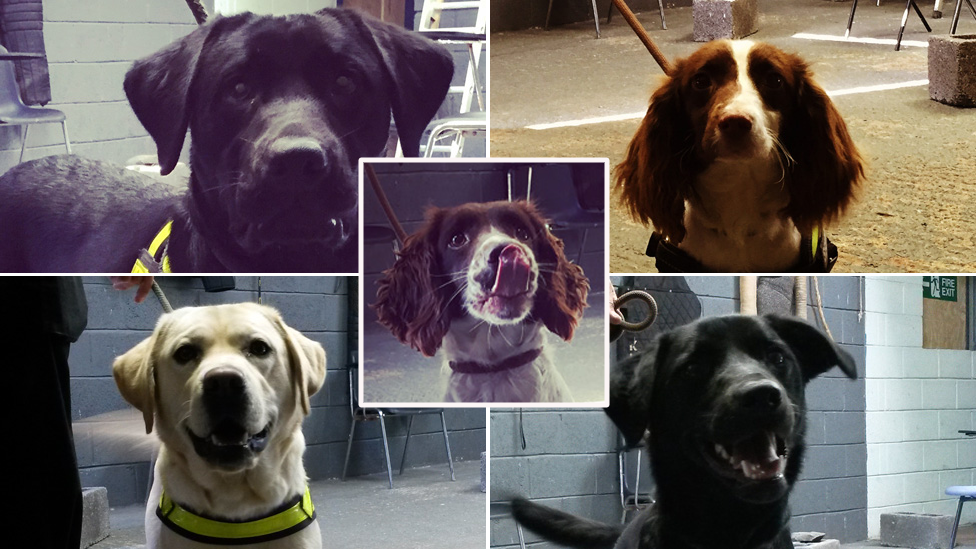
When families make the difficult decision to give their pet up for adoption, most just hope they end up in a loving environment with plenty of stimulation.
Few imagine they could be destined for conflict zones or troubled areas, helping to protect thousands of people by sniffing out explosives.
But new lives safeguarding shopping malls, hotels and embassies against terrorist bombs could await Chief, Snowy, Benson, Luna and Alfie, five of the latest recruits of the Malpeet K9 Academy in Bridgend.
Every year around 150 unwanted dogs are taken in, predominantly from south Wales, with about a third attaining the required levels to be sent to work overseas with security firms, military and government organisations.
The only entry requirements to the six-week course are that dogs have boundless energy, are "always on the go", aged between 12 and 24 months and most importantly are obsessed with a toy, to the extent "it is their life", said instructor Simon Mallin.
Other than that, it helps if the dog is a Labrador, Spaniel, Pointer or Collie and while a Dalmatian would probably be able to do the job pretty well, it "doesn't fit many people's perception of a search dog".
K9 Academy recruits ready for new lives protecting people from explosives
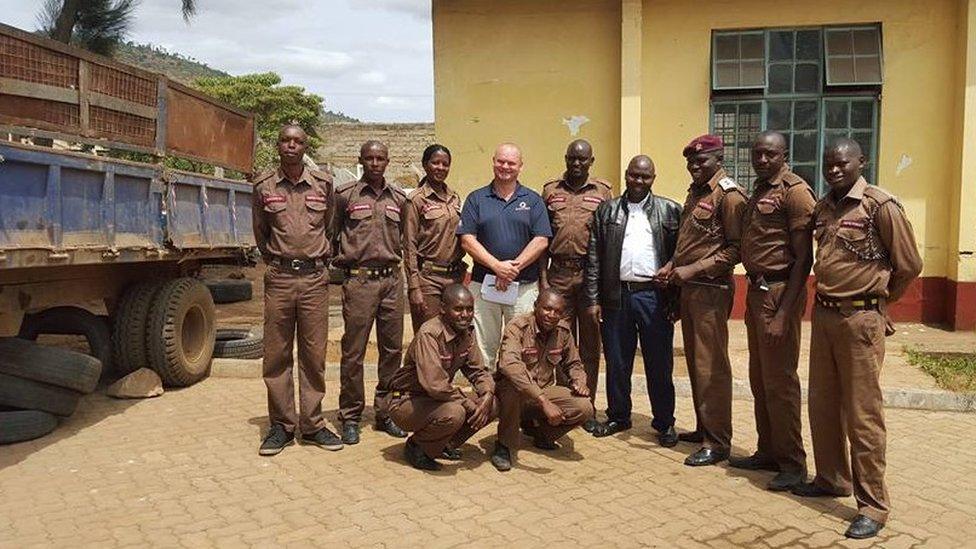
The dogs that pass the course could be sent to work in security in Kenya and other parts of Africa
There are currently eight dogs undergoing six weeks of training in the hills around Blackmill, Bridgend, where they are conditioned to sniff out small quantities of explosives, with their toy - in most cases a tennis ball or squeaking duck- given as a reward for finding them.
While the 'hide' is initially placed under one of eight concrete bricks in a shed, as the dogs' ability to find it improves, they will be taken to search larger buildings, vehicles and wooded areas, as their stamina is also built up.
Once the explosives are found, the handler clicks a hand switch, which tells the dog to move away from the dangerous area.
"Usually in combat zones, the dog will be 30 to 35 metres ahead of the handler, searching the whole area, which means if he finds something, they will know there is a safe route in, with nothing leading up to it. That area will then be secured and a bomb disposal expert will be sent in," Mr Mallin said.
Of the 10 dogs that started the current training, two have already been rejected and will be re-homed, while others may fail to reach the required standard.
-
ALFIE
×Age: 11 months
Breed: Black Labrador
From: Tredegar, Blaenau Gwent.
Background: Too much for owner to handle.
Status: Instructors unsure if he will pass training, but he is only 11 months old so still young. He may be given a break and put on another course in a few months.
-
CHIEF
×Age: 12 months
Breed: English Springer cross
From: Northern Ireland
Background: Originally trained as a gundog, but did not prove suitable.
Status: Sometimes forgets what he is doing and has a “few issues”, but instructors are hopeful he will pass.
-
LUNA
×Age: 12 months
Breed: English Springer Spaniel
From: Pontypool, Torfaen
Background: Trained as a gun dog, but was scared of the gun, so kept as a family pet. However, Luna also destroyed the family home.
Status: Luna gets a bit too excited when the ‘hide’ is found, but it's hoped she will pass.
-
SNOWY
×Age: 15 months
Breed: Yellow Labrador
From: Pontardawe, Neath Port Talbot.
Background: Owners had to give Snowy up after they emigrated to Poland.
Status: Instructors describe Snowy as very good and are pleased with her progress
-
BENSON
×Age: 20 months
Breed: Black Labrador
From: Merthyr Tydfil
Background: Family pet who “destroyed fence panels” and was “very boisterous”.
Status: Instructors are concerned he may not make it through the course.
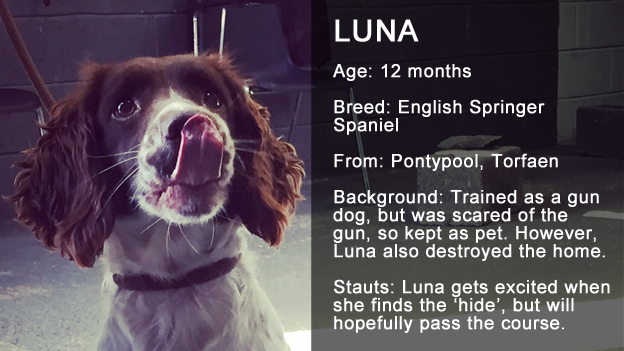
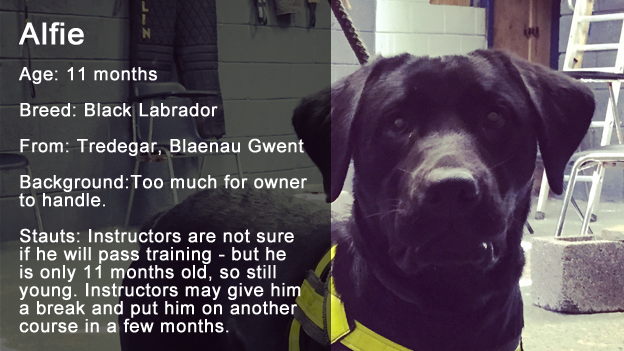
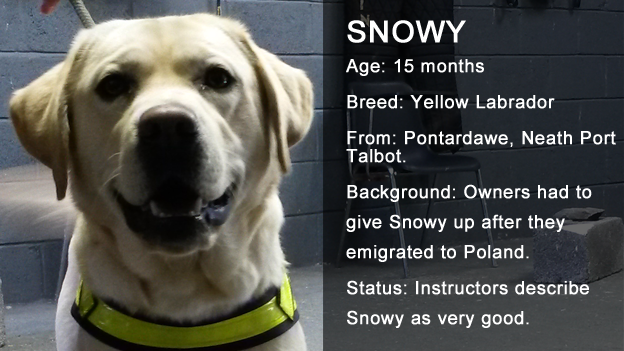
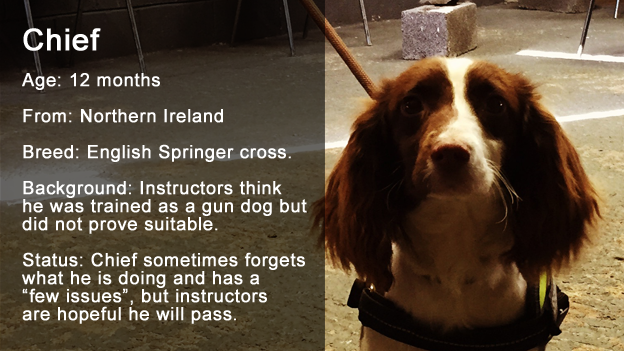
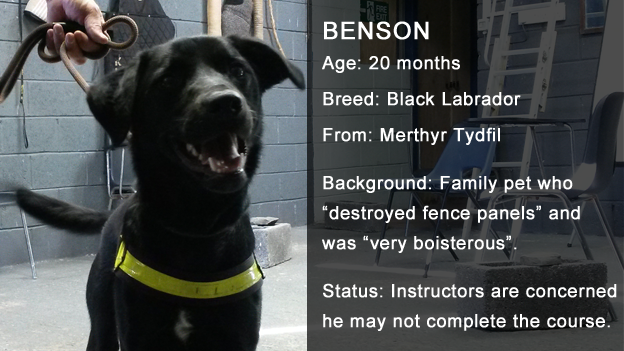
The group includes Luna, an English Springer Spaniel from Pontypool, Torfaen, who was trained as a gundog, but kept as a family pet because she was scared of the gun.
"She is insane beyond insane. When we picked her up, the owner was at the door, head in her hands saying 'help, she is going wild and destroying the house'," said Mr Mallin.
Luna is currently doing well on the course, but Mr Mallin added: "She is very fast and gets very excited when she finds the hide. But her qualities are also her flaws as she rushes through quickly and can miss things. So we are teaching her to slow down."
Another star pupil is Snowy, a yellow Labrador from Pontardawe, Neath Port Talbot, whose owners met the Malpeet team at the Fonmon Dog Show, Vale of Glamorgan, where they were running mock tests to show what dogs would be suitable for search work.
Snowy passed with flying colours and when they decided to emigrate to Poland, they remembered the encounter and enrolled her in the academy.
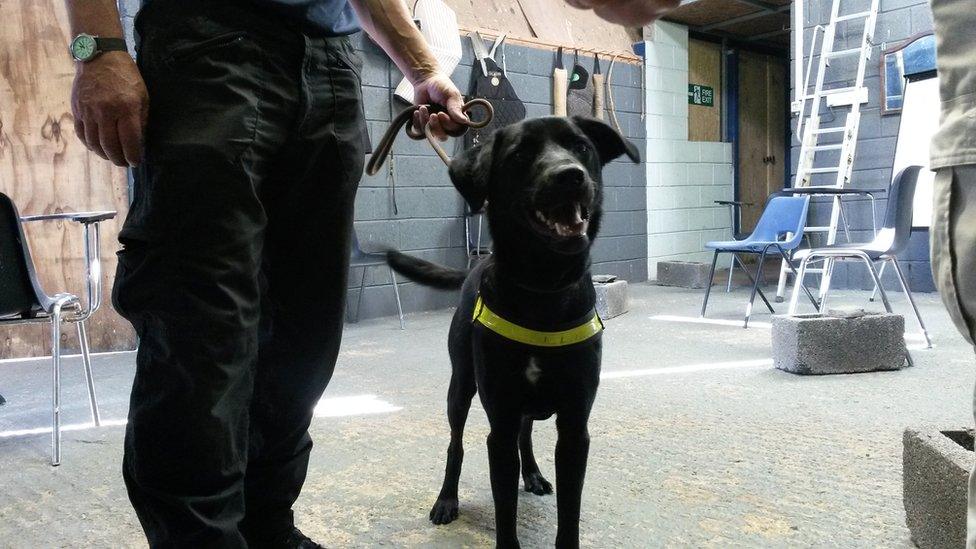
One who Mr Mallin is in two minds about is Benson, a black Labrador from Merthyr Tydfil, a family pet who was "very boisterous" and "destroyed fence panel after fence panel".
Alfie, another black Labrador, may not make it either. His owner, from Tredegar, Blaenau Gwent, bought him as a pet when she retired.
At 10 months, he started destroying her house, "running her off her feet at a million miles an hour". Mr Mallin is currently unsure whether or not he is suitable as he sometimes seems uninterested, but as he is only 11 months old, he may give him a break at his sister's kennels before putting him on another course in a few months.
Other dogs currently training include Beans, a spaniel from Kent, whose owner died from a brain tumour with his wife too upset to keep him and Chief, a springer cross from Ireland.
Mr Mallin said: "We simply don't get enough of the right type of dogs. If an owner is struggling to cope, then it may be suitable.
"What we do is meet them, have a chat and the perfect solution is sometimes to take it on trial for 14 days and give it back if it isn't.
"But often, owners are upset, especially those with children and don't want to see them again, so we have to re-home them."
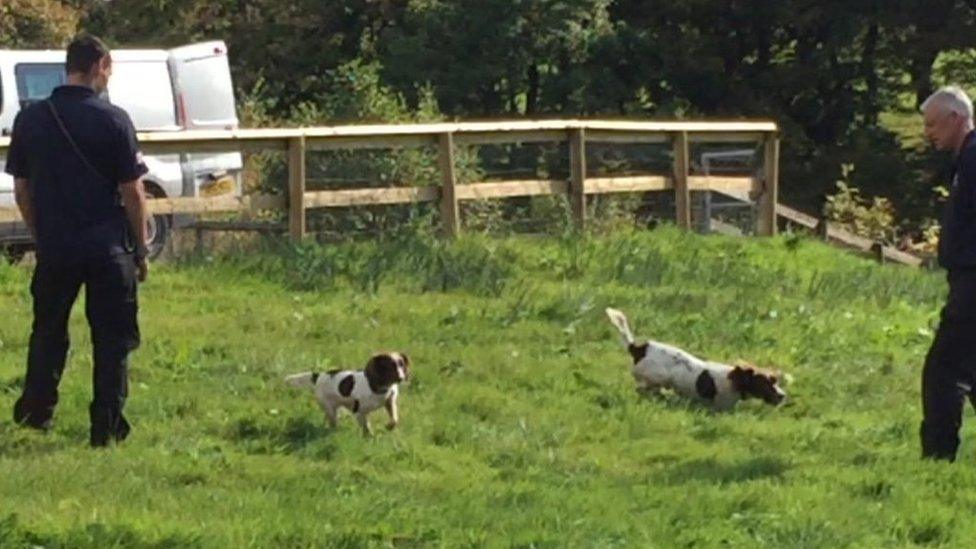
The usual route for this is through placing adverts in newspapers, but he warned: "All of our dogs are a bit bonkers, they are not always easy and need a particular type of family. They need a lot of exercise and won't sit quietly at home when they are in work, but will probably rearrange it."
As for those that do successfully complete the current course, they could be set for a new life in Africa, possibly Kenya, which has been the scene of a number of terrorist attacks including the 2013 Westgate Mall siege in Nairobi that claimed the lives of 67 people.
"There is a lot of violent crime, with gangs who will come over the walls with machetes, tooled up.
"The dogs could be helping protect businesses, private homes, embassies or hotels. After the shopping mall was hit, they need to search vehicles and people going into hotels to detect weapons and ammunition," he said.
This may not be what most people have in mind for their pets, but the dogs are at least using their energy to keep people safe instead of tormenting their owners.

Images and video
By Michael Burgess and Philip John
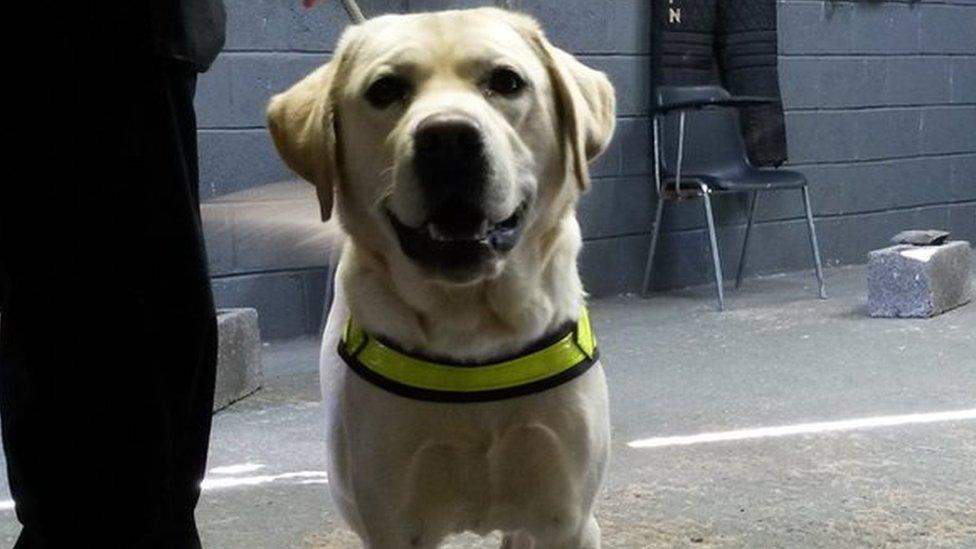

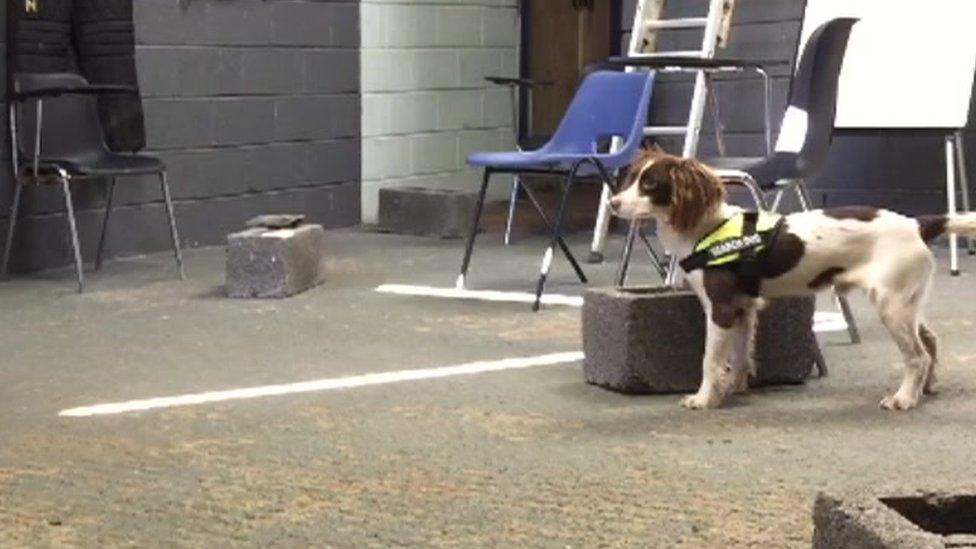
- Published2 October 2015
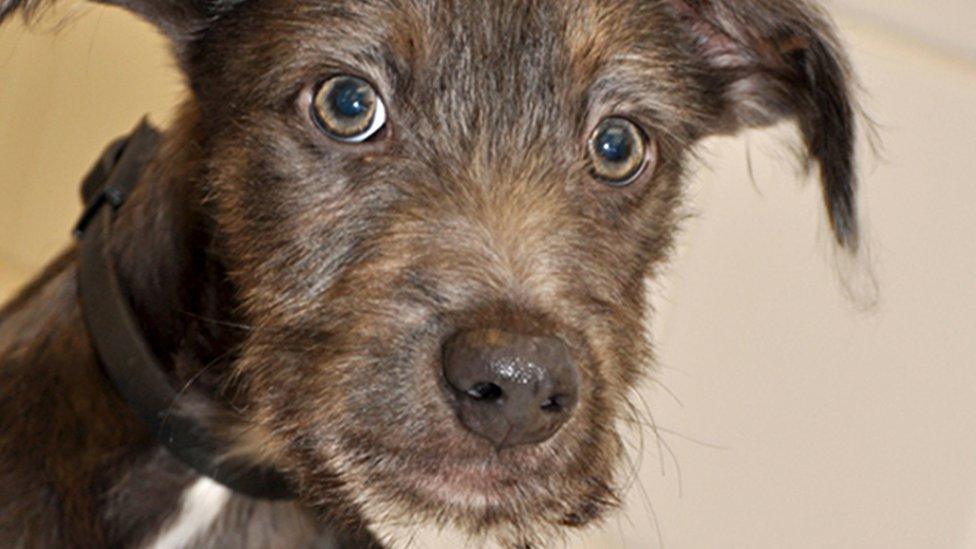
- Published9 November 2012
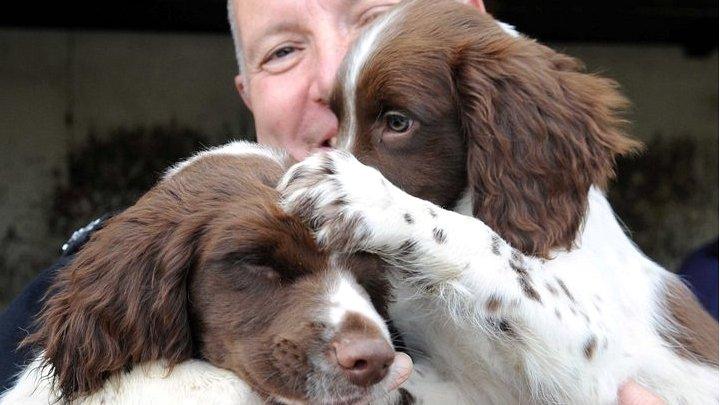
- Published19 June 2012
